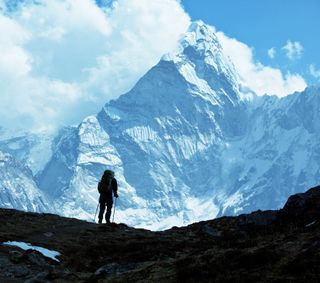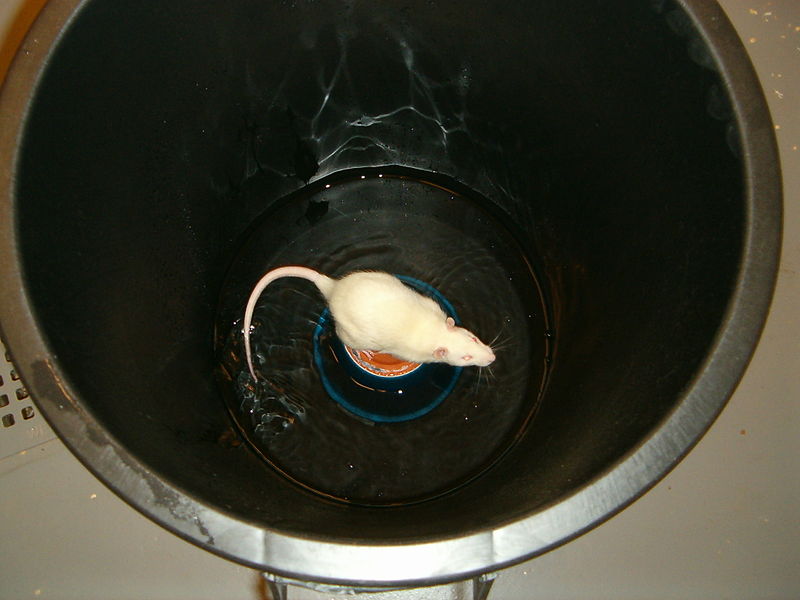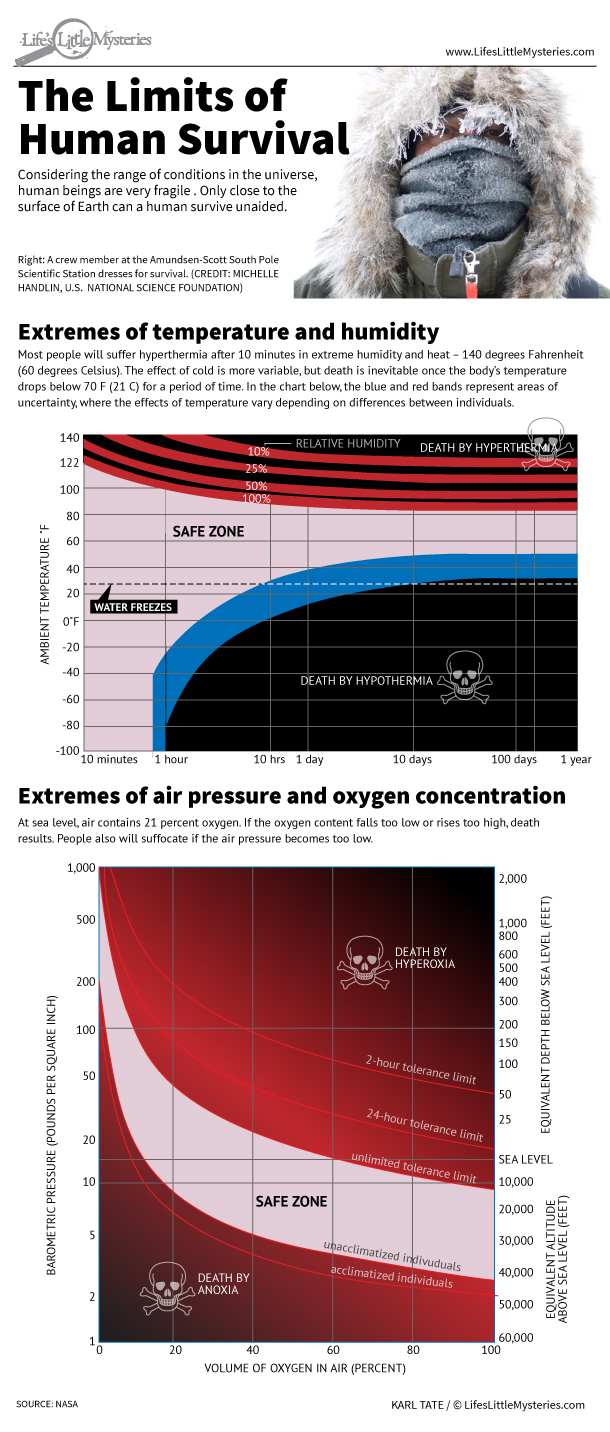human survival literally depends on the produce of _____
What Are the Limits of Human Survival?

Unmatchable hears epic accounts of hoi polloi surviving bullets to the brain, 10-story freefalls operating theater months stranded at oceanic. Just put a hominid anyplace in the known universe except for the thin shell of space that extends a couple up of miles above or below sea level connected Earth, and we expire within minutes. As strong and resilient As the anatomy seems in approximately situations, considered in the context of the cosmos as a intact, information technology's unnervingly delicate.
Many of the boundaries within which a typical human can survive have been amply grooved; the familiar "rule of threes" dictates how long we can forgo air, water and food (roughly tercet minutes, triplet years and three weeks, respectively). Other limits are more notional, because people have seldom, if ever, time-tested them. E.g., how long can you stay awake before you die? How high in AL can you climb before dyspnoeic? How such acceleration ass your body withstand before it rips apart?
Experiments over the decades — some intentional, others accidental — have helped wager knocked out the sphere within which we, literally, live.
How long can we stay put awake?
Publicise Force pilots make been famed to become and so unrestrained after ternary or four years of sleep deprivation that they crash their planes (having fallen asleep). Even a single each-nighter impairs drive abilities as very much like being drunk. The absolute longest anyone has voluntarily stayed up before nodding off is 264 hours (about 11 years) — a record curing by 17-year-old Ruttish Gardner for a high-shoal skill fair propose in 1965. Before falling asleep along twenty-four hour period 11, he was essentially a vegetable with its eyes artless. [Upper 10 Spooky Sleep Disorders]
But at what point would he have died?
In June, a 26-year-old Chinese man reportedly died 11 years into a sleepless attempt to look out every gamey of the European Cup. But he was also drinking alcoholic beverage and smoking throughout, making it difficult to ascertain his cause of death. No hominian has ever definitively died from miss of sleep alone, and for demonstrable ethical reasons, scientists can't retrieve the breaking point in the lab.

They've done IT with rats, however. In 1999, sleep researchers at the University of Chicago position rats on a rotating disc positioned all over a pool of water, and continuously listed the rats' brainwaves with a computer program that could recognize the onrush of sleep. When the rats nodded off, the disc was suddenly revolved to keep them awake by bumping them against the wall and threatening to knock them into the water. The rats consistently died after fortnight of this wretchedness. Before perishing, the rodents showed symptoms of hypermetabolism, a condition in which the body's resting metabolic plac speeds up thusly much that it burns excessive calories smooth while completely silent. Hypermetabolism has been equal to want of sleep. [The 6 Craziest Animal Experiments]
How much radiation can we soak up?
Radiation poses a long-terminal figure danger because it mutates DNA, rewriting the genetic cipher in shipway that can lead to cancerous growth of cells. But how much irradiatio will strike you dead right departed? According to Peter Caracappa, a central engineer and radiation therapy safety specialist at Rensselaer Engineering school Institute, 5 and 6 Sieverts (Sv) finished the course of a few minutes will shred up too many cells for your body to limit at once. "The longer the time period o'er which the dose is accumulated, the higher that range would be, since the personify deeds to bushel itself over that time as well," Caracappa told Life's Picayune Mysteries.
As a point of comparison, some workers at Japan's Fukushima centre set absorbed 0.4 to 1 Sv of radiation per hour spell contending with the organelle disaster last March. Although they survived in the short term, their lifetime cancer endangerment increased, scientists have said.
Even if one steers unfrosted of nuclear disasters and supernova explosions, the unprocessed background radiation sickness we all feel on Earth (from sources like uranium in the soil, cosmic rays and medical devices) increases our chance of developing cancer in a given year by 0.025 percent, Caracappa said. This sets a freakish superior limit on the human spirit traverse.
"An common somebody … receiving an average background radiation dose every year over 4,000 geezerhood, in the absence of all former influences, would be within reason assured of contracting a radiation therapy-induced cancer," Caracappa said. In brief, even if we eventually manage to uproot all disease and cut the biology commands that tell our bodies to eld, toughie luck: We will ne'er live past age 4,000.
How practically can we accelerate?
The rib cage protects our heart from a voiceless thump, simply it's flimsy security against the kinds of jostling that technology has made possible today. Upright how much acceleration can our organs tolerate?
NASA and military researchers have made strides in responsive that question for the purposes of safe spacecraft and aircraft design. (You don't want astronauts blacking out during liftoff.) Lateral acceleration — jerking to the side — does a number on our insides because of the dissymmetry of the forces. According to a recent article in Touristed Science, 14 Gs of lateral acceleration john tear your variety meat loose from one another. Head-to-foot motion, lag, plunges each the blood to the feet. Between 4 and 8 longitudinal Gs volition knock you out. (A force of 1 G is the normal force of gravity we feel here on terra firma, patc 14 Gs equals the pull of a planet 14 times as massive.)
Forward or backward acceleration appears to go easiest on the trunk, because they grant the head and nerve to accelerate in collaboration. Military experiments in the 1940s and 1950s with a "human decelerator," essentially a rocket sled that zipped back and forth across Edwards Airforce base in California, suggest we can relax at a charge per unit of 45 Gs, or the equivalent of the gravity of 45 Earths, and still live to discourse it. At that rate, you slow from 630 miles per hour to 0 mph in fractions of a second o'er few hundred feet. We probably turn into a bag of spare parts up around 50 Gs, researchers estimate. [What Would Happen If You Fell into a Black Hole?]
What environmental changes give notice we wield?
Individuals change greatly in how considerably they tolerate departures from regular atmospheric conditions, whether these are changes in temperature, imperativeness or oxygen contentedness of the air. Bounds of survival also depend on how slowly environmental changes set in, because the body can gradually adjust its oxygen usage and metabolism in response to external conditions. Just more or less jolty estimates of our breaking points can be ready-made.
Nearly humans volition suffer hyperthermia after 10 minutes in extremely humid, 140-degree-Fahrenheit (60-degrees-Celsius) fire u. Death by cold is harder to delimit. A person usually expires when their blood heat drops to 70 degrees F (21 degrees C), but how long this takes to happen depends on how "used to the cold" a person is, and whether a mysterious, latent form of hibernation sets in, which has been known to happen.
The boundaries of survival are better established for perennial-term comfort. According to a 1958 NASA report, people can live out indefinitely in environments that cooking stove between roughly 40 degrees F and 95 degrees F (4 and 35 degrees C), if the latter temperature occurs at atomic number 102 more than 50 pct relative humidity. The maximum temperature pushes upwardl when IT's less wet, because lower water content in the air makes it easier to lather, and thus, keep cool. [Infographic: Human Console Zones]
As authenticated to by any sci-fi movie in which an cosmonaut's helmet pops remove outside the spacecraft, we don't fare too well with abnormal oxygen or insistence levels. At region pressure, air contains 21 percent oxygen. We die of anoxia when that concentration drops past 11 percent. Overmuch O also kills, by gradually causing ignition of the lungs over the flow of a few years.
We pass out when the pressure drops below 57 percent of atmospheric pressure — equivalent to it at an altitude of 15,000 feet (4,572 meters). Climbers can push high because they gradually acclimatize their bodies to the drop by oxygen, but no one survives long without an O storage tank above 26,000 feet (7925 m).
That's about 5 miles (8 kilometers) upbound. The edge of the known universe lies some 46 billion soft-years farther afield.

Follow Natalie Wolchover on Chirrup @nattyover or Animation's Little Mysteries @llmysteries. We're likewise on Facebook & Google+.
human survival literally depends on the produce of _____
Source: https://www.livescience.com/34128-limits-human-survival.html

Posting Komentar untuk "human survival literally depends on the produce of _____"